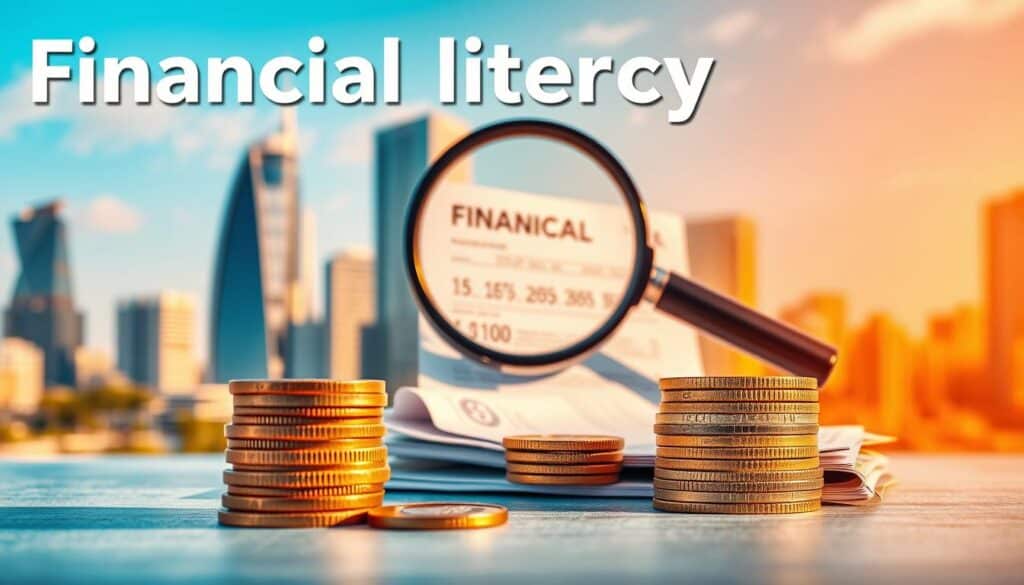Financial literacy helps empower people in Iceland economically. It teaches important skills for handling personal finances well. Learning about budgeting, saving, investing, and spending wisely helps folks make smart choices for a stable financial future.
In this article, we look into how financially literate Iceland is, its history, and what the government is doing about it. We also see how banks and other financial bodies are helping improve people’s understanding of money matters.
Anúncios
Understanding Financial Literacy
Financial literacy is knowing how to manage your money well. It means understanding personal finance concepts like budgeting, saving, and investing. This knowledge is key to having a stable financial future.
Knowing how to handle money improves your life. People who learn about finances make better choices, save more, and build wealth. Without these skills, folks might struggle with debt or not have enough for retirement.
Programs to teach financial skills are growing around the world. They help people from all walks of life learn how to be financially smart. With good financial education, individuals and communities do better financially.

The Importance of Financial Literacy in Iceland
Financial literacy is key in Iceland’s economy. It helps people make smart choices about money. This boosts both their finances and Iceland’s economy. A well-informed population drives growth through better spending and investing.
Impact on Economic Growth and Stability
When people know about finances, they can really help the economy. They make better choices about saving and spending. This makes Iceland’s markets stronger and cuts down on the need for outside money. Smart investing by more people makes the economy stronger and healthier.
Challenges in Current Financial Education
Yet, getting good financial education is hard for some. This makes it tough to manage money well. Plus, old-school teaching might not fit Iceland’s unique economy. We need education that’s right for us here. A plan that’s wide-reaching and easy to get into could make us all more financially secure.
Historical Context of Financial Literacy in Iceland
In 2008, Iceland’s big financial crisis changed how the country deals with banks and teaches about money. This event showed that many people didn’t know enough about finances. They took dangerous loans and made risky investments, especially in houses. Iceland reacted by changing banking rules to make sure banks act responsibly and protect customers better.
Lessons from the Financial Crisis of 2008
After the crisis, Iceland’s banks had to become more open and careful. They also had to teach people about money matters. This focus on financial education is helping Icelanders learn how to borrow safely and keep their finances in check.
From the 2008 crisis, Iceland learned important money lessons:
- Learning about finances lets people make smarter choices with their money.
- Knowing the dangers of debt can help avoid another crisis.
- When banks are open about what they do, people trust them more, and everything is more stable.
These lessons are key in efforts to teach more about money, aiming to create a smarter and stronger community. Iceland is working hard to make sure its people can handle their money wisely in the future.
Government Initiatives to Promote Financial Literacy
The Icelandic government sees the big need for better financial education. They’ve started many programs to help people understand money better. These efforts are made to give everyone the skills they need in our complex economy.
A key method is teaching financial literacy in schools. Schools and community centers help spread this knowledge. They cover many topics like budgeting, saving, and investing, aiming to make everyone more aware of their finances.
The government also works with banks like Arion Bank. This partnership helps mix book learning with real-world skills. It helps people feel more sure about handling their money, leading to a society that’s good with finances.
Role of Financial Institutions in Education
In Iceland, groups like Arion Bank play a big role in teaching the community about money. They put together educational programs to help people learn how to handle their finances. This helps the community and makes the banks look good too.
Efforts by Arion Bank and Other Institutes
Arion Bank is working hard to teach people about money with workshops, seminars, and online classes. These are made for people of all ages, especially young folks starting out. Other banks in Iceland are getting involved too. They’re making programs that fit with what the government wants, aiming to teach everyone more about money.
Sustainable Financing and Education Programs
Teaching about green money matters is a big deal now. Arion Bank talks a lot about investing responsibly and choosing green options. They show how these choices can be good in the long run. By doing this, banks not only make smarter consumers but also help the planet.
Empowering Women through Financial Literacy
In Iceland, empowering women is key for gender equality and economic stability. Programs in financial literacy designed for women are getting popular, changing how they handle personal finance and invest.
Women Invest Initiative
Arion Bank’s „Women Invest“ is all about reducing the investment gap between genders. It provides financial literacy workshops, educational content, and networking activities. Women learn to invest confidently, thanks to these resources. Thousands of women joining show a big interest in learning about finance.
Gender Parity and Economic Growth
Improving women’s finance skills affects gender equality and the economy. Educated women boost their finances and help the economy grow. They join the workforce more and start businesses, pushing Iceland’s economic development forward.
The Future of Financial Literacy Education in Iceland
Iceland’s future in financial literacy looks bright. Schools are updating lessons to meet today’s financial challenges. They’re making financial education a key part of learning for young people.
Teaching young people about money is key to building a financially stable country. Schools are teaming up with local groups and banks to make lessons better. This teamwork helps create classes that teach skills students will really use.
Talking about financial literacy in Iceland, we can’t forget how important it is for the economy. As things change, education must too. Programs that show real-life money situations help students handle their own and the country’s finances better.
By focusing on young people, Iceland is preparing for a better financial learning future. This ensures the next generation will be ready for any money challenge or chance they face.
Practical Skills for Financial Empowerment
Learning how to manage finances is key to financial freedom. Knowing how to budget helps people see where their money goes. This lets them spend wisely, save for the future, and set priorities.
Budgeting and Saving Techniques
Saving money effectively is crucial for long-term wealth. The 50/30/20 budgeting rule is a great plan. It means spending 50% on needs, 30% on wants, and saving 20%. This helps in building good money habits.
Investment Education and Asset Growth
Knowing about investments is also vital for financial strength. It opens doors to growing one’s wealth through different types of investments. In Iceland, more and more people are learning to invest smartly. They are getting guidance to make choices that benefit their financial future.
Leveraging Technology for Financial Literacy
Technology is key in boosting financial literacy in Iceland. Many online learning platforms are now available. They offer engaging financial education that’s easy to access. People can learn at their own speed. This makes financial knowledge more reachable for everyone. Financial technology helps us learn about money matters better. It’s great for those who find regular classrooms hard to learn in.
Online Learning Platforms and Resources
Many digital platforms provide financial education for different people. They not only teach crucial money skills but also make learning fun and interactive. This helps people understand and remember better. The key advantages are:
- Flexible learning schedules that accommodate busy lifestyles.
- Resources targeted at underserved populations, ensuring wider access to financial education.
- Utilization of cutting-edge financial technology to create engaging and practical learning tools.
As digital education gets better, it offers new ways to learn about finances. It motivates people in Iceland to manage their money wisely.
Conclusion
The journey to better financial literacy in Iceland is key for a strong economy. With the help of government and financial institutions, teaching financial skills becomes crucial. These efforts aim to make smart financial decisions a habit, especially for the young.
This focus on learning about money management can address past economic issues. It promotes a mindset of smart money handling. People will then feel ready to deal with financial ups and downs.
As Iceland invests in financial education, it builds a foundation for wealth and growth. Teaching individuals about finances prepares them for a stable financial future. It ensures Iceland remains vibrant economically, adapting to the global changes.
FAQ
What is financial literacy?
Why is financial literacy important in Iceland?
How did the 2008 financial crisis impact financial literacy in Iceland?
What government initiatives exist to promote financial literacy in Iceland?
How does Arion Bank contribute to financial literacy?
What is the „Women Invest“ initiative?
What role does technology play in financial literacy education?
What skills are essential for financial empowerment?
Conteúdo criado com auxílio de Inteligência Artificial



